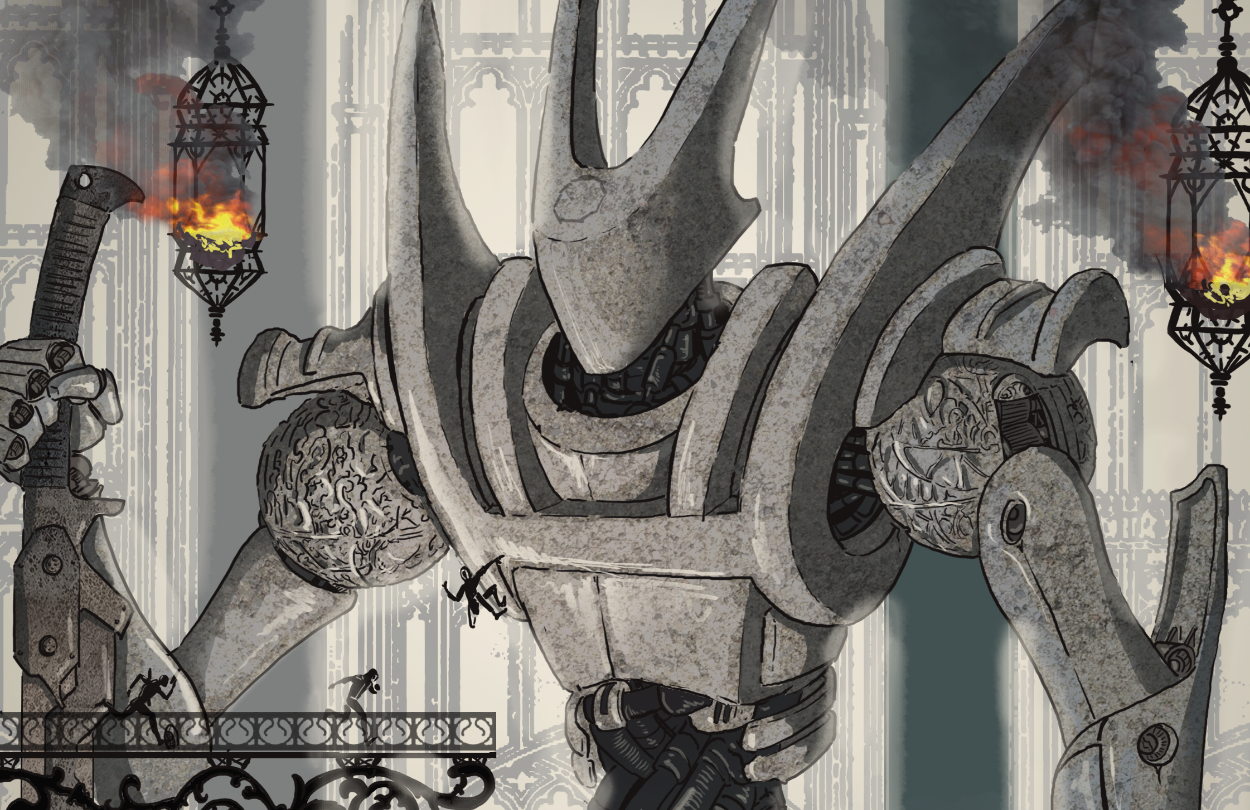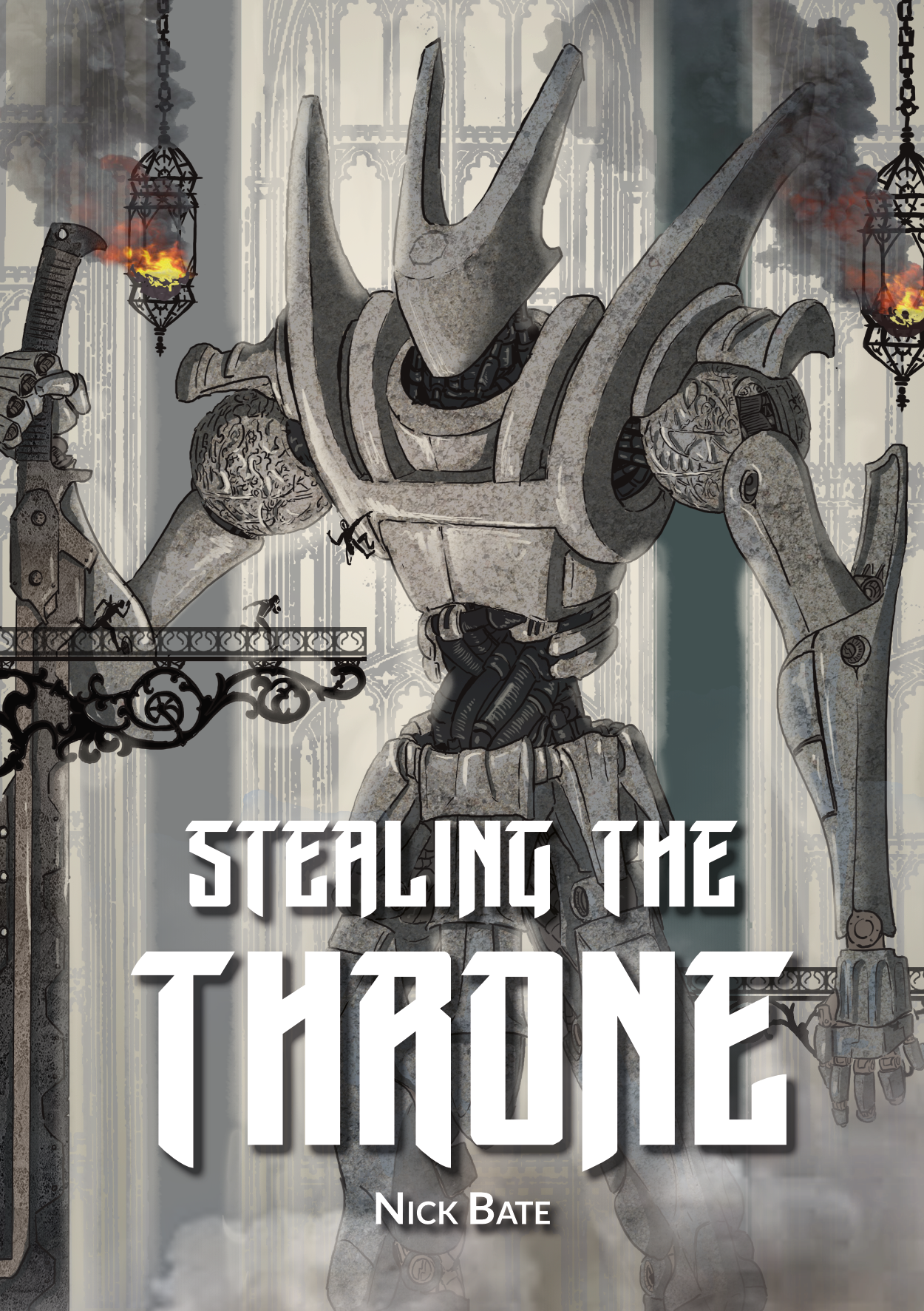A thousand years ago, we built twelve giant mecha to fight a cataclysmic war. We call them Thrones. Each was unique, a paragon of war…
Down the generations since the Great War, dynasties have formed, each drawing its legitimacy from the ownership of a surviving Throne. These titans are ancient weapons with grand legacies of battle and betrayal, but they are also symbols of dominance and entitlement. Possession of a Throne bestows wealth, power, authority over whole solar systems, and a seat on the Galactic Council.
That’s why you’re going to steal one.
Stealing the Throne is a storytelling game by Nick Bate. It is GM-less, and can be played by 3-5 players in 1-3 hours. (The game I played with four players lasted for one hour and fifteen minutes.)
The core concept of the game is evocatively summarized above, and your reaction to it probably makes this review superfluous: If stealing a giant mecha in a heist with galactic stakes makes you say, “Hell, yeah!” then you should buy this game, play this game, and love this game.
Taking a closer look, we’ll discover that the game is broken down into four phases:
- Building the Throne
- The Heist
- The Getaway
- The Finale
In Building the Throne, the players will follow a simple collaborative process that will establish the scene of the crime (where the heist will take place), the history of the Throne, the look of the Throne, and the major subsystems which define the Throne’s capabilities.
You will also, in a step whose importance may initially slip by you, establish at least three Reasons why you want or need to steal the Throne.
During the Heist, each round of play begins with a player volunteering to be the Throne — a GM-like figure who gets things rolling by establishing the next seeming insurmountable challenge in the Heist. Once the challenge has been established, a different player will take on the role of the Thief by saying, “This is what I’m here for. I’m ________, and I’m the master of ________.”
In creating your Thief, you can specify any area of expertise you can imagine, but examples include cracking impossible locks, precision timing, and forbidden technology. The Throne and Thief roleplay through the challenge, eventually reaching the Pivotal Moment in which you determine the outcome of the challenge.
The Pivotal Moment is fail-forward, with a very clever mechanic that results in one of four results:
- Unqualified success. (Woo-hoo!)
- A call for assistance. (In which one of the other players can offer their assistance to overcome a surprisingly difficult obstacle… but only at the cost of making it more difficult for them to accomplish their own goals and getaway later on.)
- A blaze of glory. (“The Thief throws in their hand and goes out in a suitably spectacular fashion,” describing how they overcome the current obstacle, but are captured or killed in the process.)
- (With the player revealing that their character is secretly a traitor, a truth which will become manifest in the fiction only later.)
In play, this process is tense, exciting, and has just the right amount of mechanical richness wed to narrative truth to relentlessly push your story right to the edge.
Each player gets one turn being the Thief and one turn being the Throne, at which point the Heist draws to a close and the Throne is seized!
But just because you’ve taken control of Throne, doesn’t mean you’ve managed to escape. In the Getaway, players have the opportunity to power up the Throne and then attempt their escape. (This is also when all sudden-yet-inevitable betrayals will play out with, in my experience, usually devastatingly amazing results.)
If any of the Thieves manage to survive the Getaway, then the Finale wraps things up. A secret vote is conducted as everyone indicates what Reason for stealing the throne is obviously the most important and must be pursued first. The almost unavoidable disputes which result inform a brief epilogue. (An alternative structure is given for epiloguing a scenario in which only one Thief escapes.)
The only other thing to mention here is that the rulebook includes several playsets, each describing a Throne. These playsets are optional, but provide a little extra structure and a fodder of creative ideas that can subtly shape and inform play in order to create unique experiences. I’m looking forward to experimenting with these playsets in the future.
There is only thing I would change about Stealing the Throne: As written, you only utter your introductory statement (“I’m ________, and I’m the master of ________.”) when it’s your turn as the Thief. I would tweak this to say that you should utter the introductory statement at whatever point your Thief makes themselves known in the narrative (including when they’re offering assistance during another Thief’s turn).
I mention this mostly because I think this minor (and only!) tweak is actually the strongest indication of just how great Stealing the Throne is. It’s smooth, it’s fast, and it’s satisfying.
(The speed of gameplay here should not be ignored: Being able to pick up a storytelling game and have an experience this rich in just over an hour is phenomenal. My guess is a typical session will be about 90 minutes long, which makes the game incredibly appealing as something you can pick up and play more or less on a whim. Or as a deeply rewarding filler on boardgame night.)
Stealing the Throne will be entering my gaming rotation. I think it should enter yours.
Style: 4
Substance: 4
Author: Nick Bate
Publisher: ickbat.itch.io
Price: $10.00
Page Count: 40
Disclaimer: I have worked with Nick Bate previously, having hired him to work on Infinity, Over the Edge, and Feng Shui.
Thanks to Heather, Erik, and Allen for playing this one with me.














Our session of Stealing the Throne lasted about 2.5 hours but it was New Years Eve and cognitive faculties were on the decline throughout the night…
That being said we had an absolute blast. Our Throne ended up being a major religious artifact and so we had a few moments of “oh these backwards idiots think their mystical god will help them…OH CRAP THIS THING IS MAGIC FOR REAL!”. That plus the epilogue tension between one thief who just wanted a payday and the other who wanted galactic liberation for those oppressed by theocracy was a fun way to cap it off.
Justin, would you care to elaborate on the Pivotal Moment’s mechanics? I’m always curious about the unique mechanics in story- and narrative-oriented games.